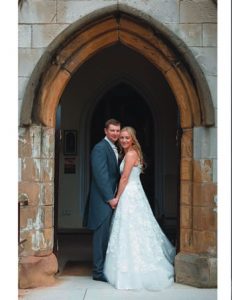Contemplating the Truth About Marriage for Life
Part I
It is a hard time to be a Catholic who loves God. The loss of Christian culture and the division inside the Church are unexpected realities which add to the difficulty of living a sacramental life. Parish life is shrinking. Those of us who are left are forced to realise just how different Catholic life is from a secular life. That old saying that the Church is ‘in the world but not of the world’ comes home to haunt us. As Catholics we suffer the pain of being human in the midst of a more popular culture which seeks pleasure and tries really hard to avoid suffering. It is rare in the Western world to find Christians who are prepared to love God as Jesus Christ loved God, ie to the point of suffering a painful death so that the world may know the truth about life and the source of human happiness.
One cannot contemplate marriage for life without contemplating parish life. They feed off each other. If one is doing well the other will do well too. The virtuous love that holds each together is basically the same. It is feminine and self-sacrificing. Its nature has not changed much since the biblical beginnings of Christian communities. What has changed is the Church’s thinking on how this sort of love is witnessed to in secular society and who needs to bear the burden of such witness. We are used to the sacrifices made by those in priestly and religious life. Now we are beginning to realise that marriage for life has its own distinctive sacrifices and more than ever those in popular culture need to witness us suffering these sacrifices happily.
On our wedding days the Church puts before us a symbolic ideal of love. It is not what a married couple might expect. It is not a picture of an ideally married couple that we can read about or look up to for example. It is Christ’s relationship with his Church which in symbolic terms is seen as his bride. The Church expects us to hold this symbolic ideal of love in our hearts whilst we go about making our marriages work long term. 
This high ideal is not a static wedding gift to be put on show or stuffed away out of sight. Over a life-time couples are always moving slowly towards an ideal of love which the Church has chosen to enshrine in the sacrament. This sacred, married movement towards God, whom we know is Love itself, needs spiritual support. Those living marriage for life need to see prophetic religious life in the parish and to hear spiritual direction from the parish priest at Mass on Sunday. Without this priestly and religious witness marriage can so easily stop moving towards a sacramental ideal of love, too often getting set in a worldly, concrete ideal of human love which may be different for each spouse. When these less sacred ideals of love crumble we see the human love that held them together dying.
If a marriage ends in divorce the Church expects the spouses involved to go on living the sacred ideal of love. Why? Is it tolerable, is it necessary for these people to go on suffering the ideal symbolic, married relationship that the Church says is part of marriage vows? What purpose does it serve? To those in popular culture this expectation seems sadistic, unmerciful in a Church that is supposed to preach mercy.
There is something vocational about living marriage for life which does not end when a marriage ends. As well as all the stuff about marriage and family life that is common to both civil and Catholic marriage, the sacrament is a means of each spouse coming closer to God. It has a spiritual dimension, not just for the marriage itself but for the individual faith journey of each spouse called to mission and holiness at Vatican II.
What the world witnesses in marriage for life is human love that is always becoming the sacrament. That means that the love spouses have for each other is always becoming more than what it seems to be on any given day. Such a love, though in the world, is not of the world. It is able, without words, to tell the world something of Love which the world cannot source for itself no matter how hard it tries. That something is the truth about life and love and it is hard, harrowing work bringing this Truth into being. A person who suffers a marriage breakdown can go on living this Truth, and many do so. Their suffering joins them to Christ on his Cross and serves to remind the world that the price of truthful love is very high indeed. 
In parish life this suffering on the part of a few for the many is a bit of a cornerstone. It has the look of the Cross and I have looked up to it at times for inspiration. The world rejects such a life-building block but Catholic pastoral life needs such foundations for its survival. It does not do to talk about survival in a Church which is supposed to be missionary. But it can be contemplated as we feel the pain of living Catholic marriage in the midst of popular culture, which rightly sees suffering as evil and wrongly tries through various means to create an ideal world where nobody should have to suffer.
In such a world the truth about love struggles to have any place. In popular culture love becomes something that is created by people without reference to God and pans out as a subjective sort of mush which is all about feelings and convenience and is very individualistic. There is no concern in this mushy love for the greater good of marriage, the family, pastoral life or indeed civil life of the nation.
These secular ideas about the nature of love and human happiness come into parish life and begin to set themselves against the more traditional ideas about love and suffering. Issues start to take root as we live our differing versions of love. In the case of marriage for life we become divided and begin to live the issue rather than the sacrament. We become super-sensitive around the issue to the point where many want, and expect, to be part of a Christian community where nobody should have to suffer being hurt by another person’s version of love. If the mere fact that those trying to live the sacrament offends those who find themselves unable to do so, and vice versa, we may as well all pack up our Christianity and join popular culture where our love is free to be all about us and where it will not be burdened with the Cross of Christ.
The Bishops in their pastoral letter speak of the love of Jesus Christ and tell us we are hurting each other around the issue of marriage for life. There seems to be a bit of straining at gnats going on here. Catholic sacramental life needs to strain against the might of God’s perfect love. For that we need a sensitivity to sin and sinfulness. It is commonly thought that we lost our personal sense of sin some time ago but now it seems we are about to lose our collective sense that local Christian communities are part of the sinful world.
The good news is that we are all sinners going the same way, all seeking the one love but at different speeds and different stages of faith. Of course we are going to hurt each other. The good news is that our suffering does not kill us, quite the opposite. Hurting each other, saying sorry to each other, saying sorry to God in the confessional, being forgiven by each other, being touched and forgiven by Jesus Christ in the sacrament, rising above our hurting egos to love in a more divine way is the stuff that makes marriages and parish life work, not perfectly, not always fairly but well enough.
Most of the failings in marriage for life can be put down to a lack of true love. Spouses hurt each other, forgive each other and move on to the next time when they are called upon to love generously rather than meanly. Once upon a time parish life reflected this life with all its hurting and forgiveness and movement or straining towards a greater love. The parish was just a bigger, messier version of home life. After Vatican II we wanted a community that was more structured with our own hierarchy of lay ministry. It worked for a while but in the local communities we built, it became much more difficult for spouses to connect their marital sacramental suffering and the whole inevitable, painful story of being human to the inevitable hurt and suffering of Christ’s humanity on the Cross thereby sharing in the greatest love that a human being can live. 
Recently when celebrating the marriage of twenty couples in Rome the Pope said, “Marriage is a symbol of life: real life: it is not ‘fiction’! It is the sacrament of the love of Christ and the Church, a love which finds its proof and guarantee in The Cross.”
Marriage for life is not easy or simple but mysterious. It has a spirituality which is worthwhile pursuing, living and gifting to parish life. In its development this spirituality should have a language of its own but it should not be the language of popular culture. We deserve better than that. As with the formation of any spirituality, befriending God, straining at God through particular sacramental vows and vocation is the stuff of ordinary, everyday Catholic life.

 Entries(RSS)
Entries(RSS)